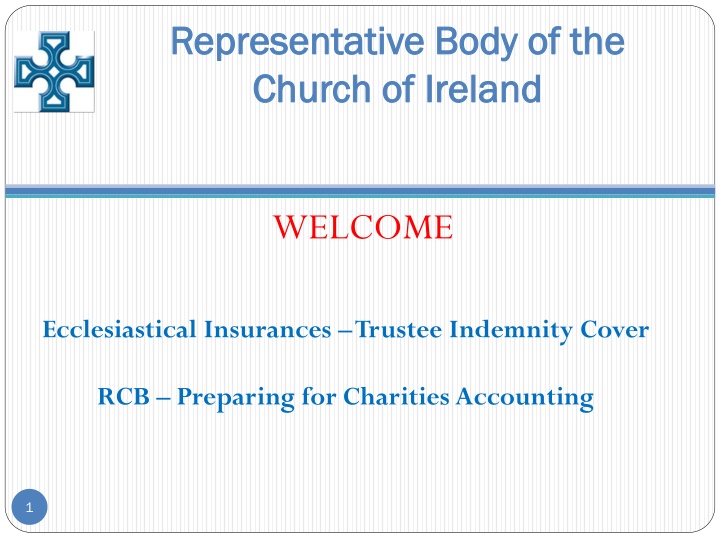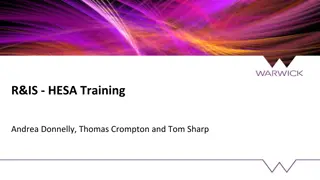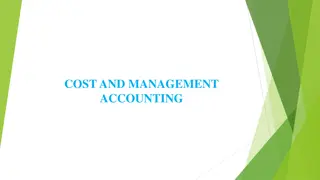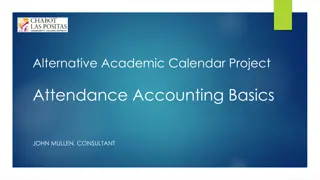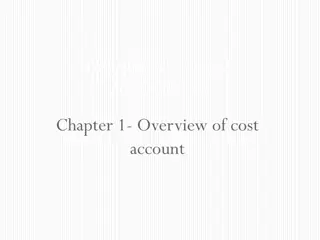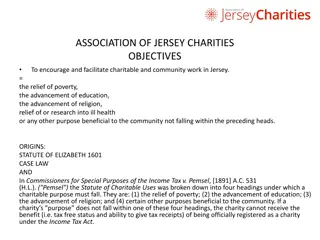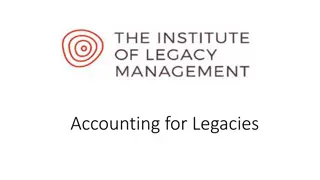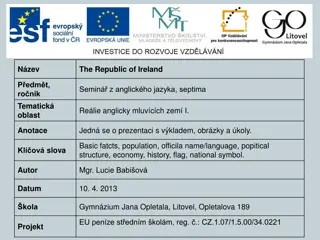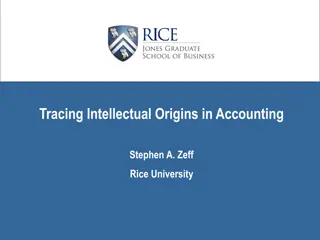Charities Accounting and Reporting Guidelines for the Church of Ireland
Welcome to the Charities Accounting and Reporting guidelines for the Church of Ireland. This resource provides information on trustee responsibilities, accounting for your parish as a registered charity, the role of annual accounts and reporting, and the importance of transparency and accountability in the charity sector. Learn about preparing for charities accounting seminars, contact details for Ecclesiastical Insurance, and the support available from the Representative Church Body (RCB) and local offices.
Download Presentation

Please find below an Image/Link to download the presentation.
The content on the website is provided AS IS for your information and personal use only. It may not be sold, licensed, or shared on other websites without obtaining consent from the author.If you encounter any issues during the download, it is possible that the publisher has removed the file from their server.
You are allowed to download the files provided on this website for personal or commercial use, subject to the condition that they are used lawfully. All files are the property of their respective owners.
The content on the website is provided AS IS for your information and personal use only. It may not be sold, licensed, or shared on other websites without obtaining consent from the author.
E N D
Presentation Transcript
Representative Body of the Representative Body of the Church of Ireland Church of Ireland WELCOME Ecclesiastical Insurances Trustee Indemnity Cover RCB Preparing for Charities Accounting 1
Paul Collins Ecclesiastical Insurance The contact details for Ecclesiastical Church Team are: Stephanie Campbell, Senior Underwriter Ph: 01 619 0324 stephanie.campbell@ecclesiastical.com Emma Fitzpatrick, Underwriter Ph: 01 619 0353 emma.fitzpatrick@ecclesiastical.com 2
Representative Church Body of the Church of Ireland Parish Treasurers Preparing your Parish for Charities Accounting Seminar III 2022 (I - 2015, II - 2018) Kate Williams RCB 3
Agenda Trustee responsibilities RCB & local supports 2009 Charities Act and Revenue rules Thresholds New concepts for the future of Independent Examination Audit What are Receipts & Payments and Accrual accounts How to account for your Parish, Group or Union Explaining restricted & unrestricted funds 1. 2. 3. 4. 5. 6. 7. 8. 9. 10. What is the statement of Assets & Liabilities and Balance Sheets? 11. Accounting for Church Property 12. Accounting for Parish Investments 13. Watch out for 4
Role of annual accounts and reporting Charities are required to CRA Function Accounting & Reporting Increase public trust Build trust Build confidence in the charity sector Provide more information Ensure accountability Be more transparent 5
Accounting for your Parish as a registered charity Trustees are responsible for: keeping proper books of account Prepare annual statements of accounts Ensuring they comply with audit obligations as required Prepare an annual report The parish trustees are the members of the Select Vestry of the Parish, Group or Union The trustees must keep either receipts & payment accounts or accrual accounts in line with thresholds 6
There is a range of RCB & local supports RCB providing guidance & support on the charities registration process via synod office RCB finance department have developed a series of supports for Parishes which are available on the Church of Ireland website under parish resources/parish finances 1) Example Receipts & Payment Accounts 2) Explanatory Notes on receipts & payment accounts 3) Glossary of terms for receipts & payment accounts 4) Example SORP compliant accrual accounts 5) Explanatory notes on SORP compliant accrual accounts 6) Glossary of terms for SORP compliant accrual accounts 7) Guidance on accounting for Church property 7
RCB & local supports (continued) Treasurers networks Diocese are encouraged to support the formation of local treasurer networks to share learnings Select Vestries are encouraged to seek out local resources & experts in Parish to support with email, new format of accounts, charities reporting, etc. RCB Parish seminars (2015, 2018 & 2022) RCB Parish Resource - (www.ireland.anglican.org/parish- resources/parish-finances) SV encouraged to set up a Parish email address for communicating with the regulators office & the RCB (htdunshaughlin@gmail.com) 8
Legislation & Thresholds What is the current position New regulations New concepts 9
Current position The 2009 Charities Act & Revenue rules Charities with income or expenditure in excess of 100,000 are required to prepare audited accounts Charities with income or expenditure less than 100,000 can prepare simplified accounts New thresholds have been recommended by the Charities Regulatory Authority in the 2016 Regulations, however, we are still waiting for the legislation to be enacted. The CRA Head of Compliance has noted the CRA would expect charities to be compliant with the law 10
Income threshold under the 2009 Charities Act & Revenue rules Requirements 2009 Act Preparation of full accrual accounts which must be audited comprising of Statement of Financial Activities, Balance Sheet, Cash flow and notes Preparation of simplified accounts comprising of a statement of receipts & payments and statement of assets & liabilities No requirement to file accounts with CRA or to have accounts audited Gross income / expenditure > 100,000 Gross income / expenditure between 10,001 and 100,000 Gross income / expenditure < 10,000
Income thresholds Recommended in 2016 Regulations Requirements 2016 Regulations not in law yet Charities with income of 250,000+ Trustees prepare FRS 102 accrual accounts to be independently audited by a professional auditor Statement of financial activities, Balance sheet, Cash flow statement and notes to the accounts Trustees prepare receipts and payments accounts to be independently examined Statement of Receipts and Payments, Statement of Assets & Liabilities and notes to the accounts Minimal reporting annual return and no requirement to file accounts with the CRA Charities with income more than 25,001 but less than 250,000 Lower threshold - 25,000 or under
While an audit may not be required below specific income thresholds o Governing documents or Diocesan rules may require Parishes to audit financial statements o Funding providers e.g. government grants may require financial statements to be audited as part of funding requirements o An audit requires the appointment of an independent auditor or firm of auditors who give an independent opinion on the financial position of the entity. 14
The 2016 Regulations (not enacted ) introduce the new concept of Independent Examination Where the income threshold is less than 250,000 the concept of independently examination is introduced Independent Reviewer of Charity Accounts: o An independent person who, in the reasonable opinion of the Select Vestry (Trustees), has the requisite ability and practical experience to carry out a competent review of the accounts. o If on an accrual basis reviewer must be a member of a relevant professional body i.e. accountancy body Format/content of independent reviewer s report specified in the regulations. Important that there is no conflict of interest between a member of the trustees and the independent examiner.
Audit 1. Current audit threshold under Revenue rules - income or expenditure of 100,000 or more 2. Audit opinion provided and included in the financial statements 3. Tends to be expensive costs will vary depending on size of Parish
Calling forward for registration with the CRA Parishes registering with the CRA will require a charity number (CHY) from the Revenue Commissioners Revenue will request a set of the latest financial statements and will note if income or expenditure is greater than 100,000 accounts should be audited It is the intention to call forward Parishes under the 100,000 threshold in the first tranche of Parishes to registrations The RCB will work with Diocese to identify Parishes who fall into this category Those over 100,000 will be called forward in the second tranche
Transitioning what type of accounts to prepare and for what? Receipt & Payment Accounts Accrual Accounts Accounting entity the unit 18
Receipts & Payments Accounts o Simpler form of accounts based on money received and paid both through the bank /cash accounts for the financial period/year o Best practice is to include a statement of assets & liabilities and notes to the financial statements o Financial statements should be signed by two trustees o Future looking - When new regulations are enacted the majority of Parishes will fall within receipts & payment accounts thresholds (i.e. under 250,000) but there will be a requirement to have an independent examination 19
Accrual Accounts o Here the income or expense of a particular activity is accounted for when the liability is incurred or when there is an entitlement to certain income o Uses the concept of accruals to account for expenses not paid but the work was completed in the financial period e.g. repairs work carried out but not invoiced would be accrued into the financial statements o Uses the concept of prepayments to bring in income not received but due in the financial period e.g. donation made on 31st December not received until next accounting period would be taken into the financial statements as a prepayment 20
Parish, Group or Union what unit do we prepare accounts for? Entity Select Vestry Prepare Single Parish with a CRN number One Select Vestry - registered as one charity with CRA Prepare financial statements for the single parish Group of Parishes each with their own CRN number Each Parish in Group will have Select Vestry and each Parish in group will be registered with the CRA Prepare financial statements for each Parish within the Group Union of Parishes which are all registered under the one CRN number The Union will have one Select Vestry and will be registered as one unit with CRA Prepare one set of financial statements for the Union of Parishes - may mean separate Parish accounts will be consolidated into one set of FS 21
Transitioning what to include in your Parish accounts? Types of funds Balance Sheet or Statement of Assets & Liabilities Church Property Parish Investments 22
Restricted and Unrestricted Funds Restricted Funds Funds received for a specific appeal and which can only be used for that specific purpose Church roof repair fund Unrestricted Funds Income arising which can be used for general Parish purposes Endowment Funds Funds donated or bequest made which can be either restricted or unrestricted and either permanent or expendable. 23
Unrestricted Funds Restricted Funds Endowme nt Total 20xx Total 20xy Note 20xx 20xx Funds 20xx Receipts Donations & plate collection Proceeds from Fund Raising Events Legacies Bank & Deposit interest Investment income Rental of premises Sale of assets Sale of investments Grants Receipts from General Trustees Other Receipts Receipts from Parish Organisation s Total Receipts Example of receipts and payments accounts by fund 24
Statement of Assets & Liabilities and Balance Sheet Most Parishes won t have produced a statement of assets & liabilities or a Balance Sheet What should be included: 1. Fixed Assets The RCB has produced guidance for Parishes on how to value church property (Church, Grave yard, Parish hall, Rectory & any land) 2. Investment held in trust or managed by the RB in the General unit trust or other investments 3. Cash held by the RB 4. Bank all bank accounts 5. Debtors amounts due to be collected which have not been received but are included in the accounts (Accrual accounts only) 6. Creditors e.g. suppliers or money owed which has not been paid but due (Accrual accounts only) 7. Bank Loans any loan from banks or other financial institutes The Statement of Assets & Liabilities is less onerous Full Balance Sheet is more complex 25
Statement of Assets & Liabilities Restricted Funds 20xx Unrestricted Funds 20xx Endowment Funds 20xx Total 20xx Total 20xx Cash Funds Current Accounts Deposit Accounts Total Cash Funds Investment Assets Equity Investments Other Listed Investments Investments in RCB / CIT Unit Trusts Other unlisted investments Investment Properties Total Investment Assets Assets retained for the Parish s own use Parish Centre Glebe House Fixtures and Fittings Total Assets retained for the Parish s own use 26
Accounting for church property RCB holds Parish property and land in trust for the Church of Ireland Property includes Churches, Graveyards, Glebes, Glebe Land, Parish Halls and other Parish properties Where the property is vested in the RCB the property should be included in the Parish statement of assets & liabilities Where the property is vested in the Parish, then the property should be included in the Parish statement of assets & liabilities Where the property is vested in individual or independent trustee these circumstances will need to be considered individually
Church properties Church property Valuation Historic Churches & Graveyards Can be recognised as a heritage asset and where its cost or valuation is not available no value need be ascribed in the statement of assets & liabilities but a note needs to be included Churches built in latter part of twentieth century Can be recognised as a heritage asset however, where costs are available a value will be ascribed in the statement of assets & liabilities to the property
Church properties Church property Valuation Parish Halls / Centres Option 1 - Is physically attached to Church Can be deemed a heritage asset refer to accounting treatment above of Church property deemed heritage asset Parish Halls / Centres Option 2 - Is not physically attached to Church and no reliable record of cost exists A value should be ascribed, however, if parish hall was built at a time when no reliable record of costs of construction or acquisition exists then no value need be ascribed Parish Halls / Centres Option 3 - Is not physically attached to Church and a reliable record of cost exists A value should be ascribed where a reliable record of cost of construction or acquisition exists. The parish hall will be recognised in the statement of assets & liabilities or the Balance Sheet at the cost of construction or acquisition.
Church properties Church property Glebe Option 1 - Which stand on their own grounds and could be placed on the open market or sold separately Valuation Record in statement of assets & liabilities at cost or deemed cost. Cost is cost of construction or acquisition. Deemed cost might be the valuation placed on the property for local property tax valuation or rateable valuation Record in statement of assets & liabilities or Balance Sheet at cost or deemed cost. Cost is cost of construction or acquisition. Deemed cost might be the valuation placed on the property for local property tax valuation or rateable valuation Glebe Option 2 - Which stand within the grounds of the Church &/or graveyard and could be placed on the open market or sold separately Glebe Option 3 - Which stand within the grounds of the Church &/or graveyard and could not be placed on the open market or sold separately These properties should be ascribed a value in the statement of assets & liabilities or Balance Sheet. However, where no reliable record of cost of construction or acquisition exist and a valuation of such a property would lack sufficient reliability, then no value need be ascribed in the accounts.
Church properties Church property Glebe lands Valuation May be valued at the market value of an acre of land in the area. Depreciation on Church Hall or Glebe The select vestry may not need to provide for depreciation where it deems: 1. The SV maintains the property in good repair 2. The current estimated residual value is not less than the carrying value / book cost 3. The remaining useful life of the building exceeds 50 years Please note insurance valuations of your property is a separate matter and you will need to discuss insurance valuations with your insurance broker
Parish investments Parish Investment Valuation Externally managed parish investments should be included in the statement of assets & liabilities Valuation to be included on Statement of Assets & Liabilities or Balance Sheet will be the market value of the investments at the year end Who might external fund managers be: The external investment manager (RCB/CIT/other) will be able to provide a year end market valuation per unit RCB General Unit Trust ROI or NI Church of Ireland Trustees (NI only) Shares Independently held RCB General Unit Trust Investments Where the investments are held in trust by the RCB a note should be included on the statement of assets and liabilities or the balance sheet to note that specific investments or funds are held in trust by the RB Investment valuations may be obtained from the RCB for the Parish year end accounts after year end The Church of Ireland web site under Parish resources provides a facility for a Parish to value its own investments and obtain a valuation immediately
Transitioning watch out for Parish bank accounts Payments to employees or other Cyber crime Parish Resources 33
Parish Bank Accounts Parishes historically have produced accounts for each bank account held on a receipts and payments basis. Going forward need to bring all accounts into one set of Parish accounts. Need for Parish organisations to produce accounts for the same accounting period (i.e. all tie in with the same year end date). Include activities which are part of the parish e.g. choir, active retirement group, flower club. Organisation with national head-quarters should not be included in your Parish accounts e.g. Boys Brigade, Girls Friendly Society, Girls Brigade, Mothers Union, these organisations will produce separate accounts. 34
Parish Payments Parish employees are those who are employed under a contract of employment and who are paid a gross salary with PAYE & related taxes deducted and remitted to Revenue by the Parish Clergy paid centrally by the RCB are office holders and not deemed to be employees Gift vouchers up to a maximum of 500 can be paid to an employee Out of pocket expenses paid to volunteers should be vouched by a receipt Honoraria payments should be dealt with by the individual receiving the payment in their annual tax returns 35
Cyber Fraud Cyber criminal activity has increased significantly Be careful if you get an email to advise of a change to a bank account for a supplier or contractor always make a person to person phone call to the person to confirm the change is genuine Be aware of suspicious looking emails pertaining to come from someone you know asking you to transfer funds urgently don t do it! make a phone call first Be aware of phishing emails asking you to click on links 36
Finally The RCB will be working with Diocese to call forward parishes for registration and your Diocese will communicate with you 1. You should assess the parish income and expenditure to establish if Parish will fall under or over 100,000 income & expenditure threshold 2. You should have a look on Parish resources for the sample accounts and guidance notes 3. Seek out local support if you need guidance 4. Recommend Parishes commence to transition to the sample receipts and payments accounts 5. 37
Image result for images of accountants feeling happy Hopefully this will be child's play Thank you Thank you & & any questions any questions Image result for images of work all done 39
